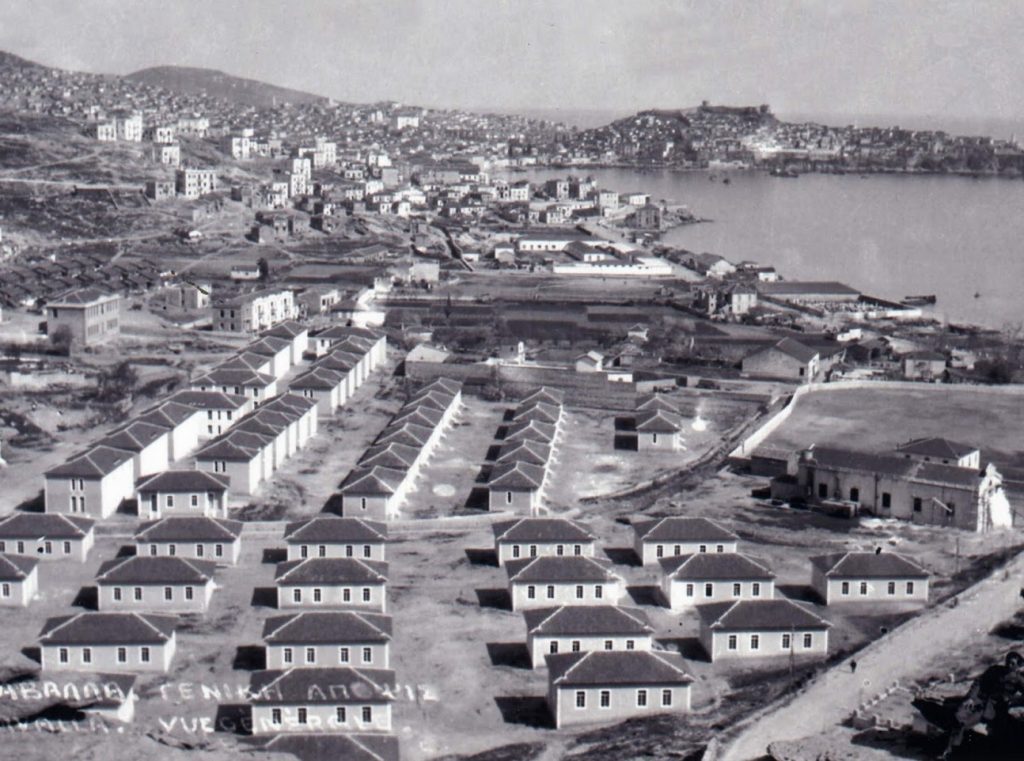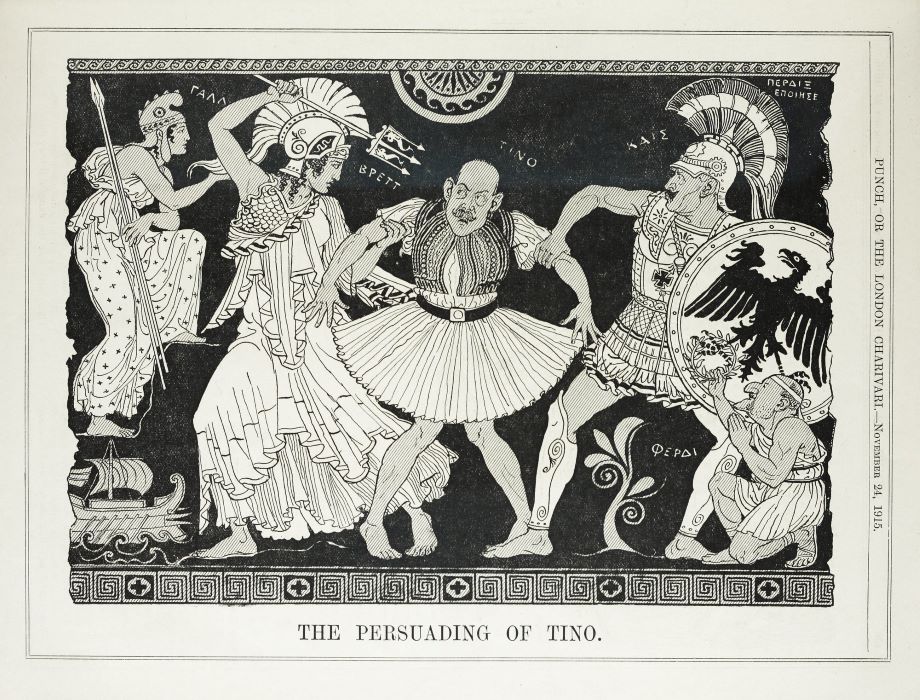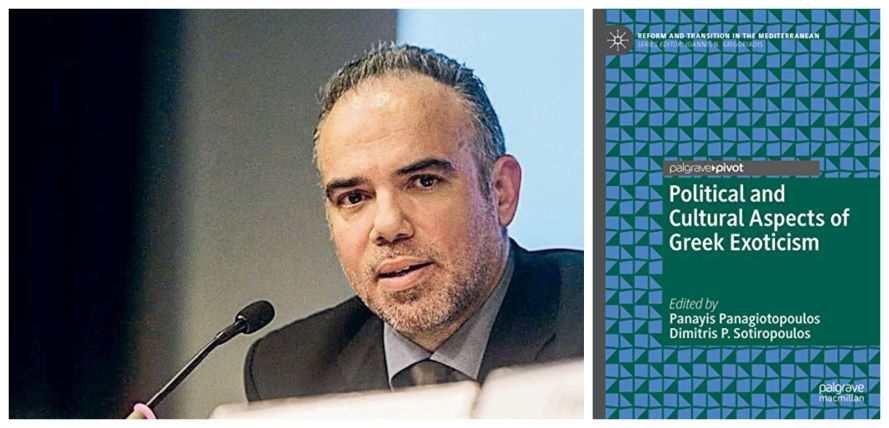Dimitris P. Sotiropoulos is Professor of Contemporary Political History at the Department of Administrative Science and Technology of the University of Peloponnese. He is Greece’s representative at the Observatory on History Teaching in Europe of the Council Europe and the general editor of New Hestia (Νέα Εστία), a Greek literary magazine that has been on circulation since 1927. His recent publications include “Phases and contradictions of the Greek state in the 20th century, 1910-2001” (in Greek, 2019) and Political and Cultural Aspects of Greek Exoticism (co-edited with Panayis Panagiotopoulos, 2020).
Professor Sotiropoulos spoke to Rethinking Greece* on the success story that was establishing the modern Greek state ‘from scratch’ since 1830, the importance of capable elites and mature societies in overcoming crises, the concept of “Greek exoticism” and the ambivalence of the ‘Western’ gaze on Greece, how the country has ultimately managed to benefit from its geopolitical significance, and how Greek ‘syncretism’ has historically enabled the country to course correct. Sotiropoulos suggests that the next strategic goals for Greece should be the implementation of a new productive model and bold reforms in higher education and public administration; finally he proposes that the “Greek life”, the art of living well, is a concept that we should further develop and utilize to stand out as an advanced country that has as a priority the well-being of its people.
Your work could be considered as part of a new trend in Greek historiography and political science that argues that the modern Greek state was a success story, making a sharp break from previous schools of thought (theory of dependence, “clientelistic state”) and perceptions of “Greek exceptionalism”. Would you like to tell us more about your approach?
Indeed, recently, national literature on the Greek state has been enriched with 4-5 new studies by historians and political scientists which break away either from the classic scheme of foreign dependence, or from our “beloved” Greek exceptionalism. However, this new perception that has since become prevalent and tends to describe the Greek example as a “success story”, should not be misunderstood as a simple attempt to move the pendulum from the old self-flagellation to a tardy self-admiration. This is not about that. After all, there are other examples of nation-states in Europe that have had a very successful trajectory in the course of time, and we do not hold exclusive rights to success.
To begin with, the concept of success is always relative. It is determined, first of all, by the starting point and the prospects that opened up at the birth of a new nation-state. Let me just remind you that neither the Revolution of 1821, which seemed defeated as early as 1825, nor the Greek state itself, whose creation was completely unanticipated, was a cause in which one would initially bet one’s money. And yet, for various reasons, the Revolution achieved its goal, despite its limited resources and civil wars, and what is more, the new Greek state managed, albeit its very small size, to stand on its own two feet and gradually adopt institutions that were pioneering for its time.
And not only that, this new state will manage in the process to integrate in its territory, more than double its original size areas and populations, in many cases in fact, thanks exclusively to the organization and implementation of its own (and not foreign) plans for the realization of the Great Idea (eg as in Balkan wars). The very fact of the administrative and social integration of all these new areas and populations (and later of more than one million refugees) in the Greek territory is a feat in itself and it should not be taken for granted just because the populations integrated were Greek.
In fact, there is an even more important parameter: in contrast to the French Revolution, which inherited from the monarchical regime an organized state and institutions with a long history, the Greek state is called to be established from scratch. And yet it succeeds, in the beginning thanks to the foreign elites who take over its government, but also thanks to domestic groups of power, part of whom in fact prove to be very capable in modernizing the state. Because our current observatory is one of a time of great turmoil for the Greek state, there is a tendency to focus on bankruptcies, dictatorships and civil wars, which have not been few during these past two centuries. However, it is worth remembering that such episodes are not absent from the history of almost any modern state, including the most powerful. The major question is whether a state has capable elites and mature societies to overcome such crises and recover. And these variables were present throughout all phases of the Greek state.

In your contribution to the book you co-edited, “Political and Cultural Aspects of Greek Exoticism” you analyze historically the patterns of “Greek exoticism”, noting that it emerged more strongly as a phenomenon in times when Western cultural projections for Greece met the geopolitical interests of the ‘great powers’. Did this also happen during the financial crisis of 2010? Is the latest version of “Greek exoticism” different from its previous incarnations?
Greek exoticism is certainly a form of Orientalism, however with important particularities, since Greece was considered by other Europeans (and by Americans) as the cradle of Western civilization, whether as the West of the East or the East of the West. Thus, their gaze was always ambivalent: on the one hand idealizing and with excessive expectations from the “descendants” of Aristotle and at the same time dismissive and partly arrogant, not only because they were disappointed by the domestic scoundrels who probably did not look much like the great ancient philosopher, but also because they never stopped operating in acold-blooded manner, seeking to advance the expected priorities of any Great Power.
Thus, when geopolitical necessities prevailed in times of intensifying international competition in the region, such as in the 1820s, 1910s, or 1940s and 1950s, the dominant cultural projections were adapted accordingly. At the same time, however, due to the complex significations that accompany, as we said in the beginning, “the Greece paradox”, movements were created internationally against “xenocracy” (i.e. foreign rule) in the country. The small country of Greece, as a “geopolitical nation” and as a symbol of democratic fantasies, has been frequently transformed into a site that prefaced international developments.
During the 2010’s Greece became such a site where international developments were played out: on the one hand, its bankruptcy and its weak productive model highlighted the structural problems of the single currency, so its expulsion from the Union looked like it could be a resounding warning for the rest of the eurozone PIGS; at which point the cultural projections from the West were the well-known stereotypes about the lazy people and kleptocrats of the South. On the other hand, populists everywhere (on the Right or the Left), anti-Europeans, etc. projected here all their confessed and unacknowledged desires for the collapse of capitalism, the EU, the euro, “bourgeois democracy”, and so on.
Thus, foreigners of the extreme Right and the extreme Left suddenly found themselves together in defence of domestic drachmists (those who supported the re-introduction of the drachma) and the –exceptionalist in their view of Greece– Indignant Citizens Movement (the Greek ‘Indignados’) who imagined Greece as the Cuba or Venezuela of the Balkans. These foreigners, found in the modern ruins (and innocent victims) left behind in Athens by the great anti-memorandum demonstrations of the time, and in the general social deregulation, the corresponding ruins that European Romantics were looking for in the archaeological landmarks of the 18th and 19th century, with indigenous peoples living in poverty and ignorance, waiting for outside enlightenment to understand who they were. I do not honestly see how this paternalism differed from that of the “imperialists” of the past.

You often use the concept of “anti-imperialism without colonialism” to describe a –at least until recently- popular perception in Greece of ‘foreign intervention’ in the country. Although Greece never really colonized, some analysts speak of “crypto-colonialism.” Do these post-colonial approaches have anything useful to tell us?
Greece has never been neither a colony nor a crypto-colony. Other factors are required to characterize a regime as colonial, such as those established in India or in African countries. First of all, foreigner powers had little economic interest in Greece over time. What characterized the country from its formation was a charged relationship with the Great Powers of each era. First and foremost because, as we said earlier, the Great Powers themselves projected on the country their own fantasies and expectations of modern Greece as a heir to antiquity, and the small state has not always been able to meet these expectations.
Secondly, geopolitical interest in the region has been very high over time. In fact, Greece has oftentimes served as the “advanced outpost” of the West in major international conflicts, both in the 19th and 20th centuries. So, these interventions and interferences in the country’s internal affairs by the Great Powers created this whole sense of “xenocracy” (foreign rule). In turn, this perception has been politically and ideologically instrumentalized from time to time by domestic political forces that wanted to present themselves as anti-systemic. It should also be noted that because the Greek state, in the context of the Great Idea, viewed the Cyprus issue as its own affair and because Cyprus was indeed under colonial rule, this sense of anti-imperialist struggle, especially after WWII, was -somewhat vicariously- further strengthened.
The main problem with “anti-imperialism without colonialism” is precisely that it reinforces this feeling of being an underdog, which can permeate small nations of the periphery, creating a sense of perpetual victimization by the powerful. In other words, it creates a collective mindset of miserabilism and defeatism or, vice versa, one of the perpetual resistance fighter. On the other hand, reality is much more complex, because the interventions of the Great Powers were not continuous; furthermore very often it was the Greek side that had asked for their assistance and protection from external dangers or from its occasional bankruptcies, protesting when they denied it, or when they expected something in return – as was natural on their part.
However, whenever the Greek state managed to stand on its own two feet and organize its own developmental or diplomatic plans, utilizing international politics prudently and methodically, it was never hindered by foreigners in its success. Finally, I do not see how a country that has managed to more that double its territory and population in a century, to be one of the fastest growing countries of the developed world and to belong in all the major international organizations, can claim to be a victim of colonialism.

In your book “Phases and Contradictions of the Greek State” you mention that Greece’s path to modernization –like that of other countries– looks more like a zigzag than a straight line, and is based more on syncretism rather than on the clash between traditional and modern elements. Could you expand on that?
We usually tend to blame our modernization woes on the absence of a bourgeois class, a perception has more to do with the Marxist origins of our thinking. But what was missing from Greece was actually an aristocratic class, because otherwise, a kind of bourgeois commercial class, and in fact one with a pan-European and pan-Mediterranean scope of action, had existed since the 18th century. But, with the possible exception of the Phanariots in Constantinople and the nobility of the Ionian Islands -who were later incorporated into the newly formed Greek state- there was no upper class whose presence would create clear class delineations from the rest of the population.
Due to this absence, a sort of class uniformity was imposed, which did not particularly allow for social discrimination. At most, social discrimination was limited to the differences between urban and rural areas, or between the illiterate villagers and the ‘schooled’ people of the city, mainly in the 19th century. From the 20th century onwards, the steady upward mobility that characterized Greek society was aided by precisely those family strategies of investing in education and schooling as well as in (mass) immigration to urban centers. At the same time, the aversion of the popular classes to proletarianization led to the creation of this ocean of petty bourgeoisie and small business entrepreneurship that characterizes modern Greece.
To get to your question, a constant feature of the petty bourgeoisie is its versatility and even more so its eclecticism. The petty bourgeois makes, in other words, a selective use of elements from both tradition and modernity. For example, in order to maintain his communitarian references, he organizes his cities as small villages, while at the same time, in order not to miss the ‘train’ of development and its benefits for his life, he basically votes for politicians who make sure that the country will keep up with the West. Accordingly, the political class has to simultaneously fuel clientelistic relations, at the same time as it is called upon to conceive and develop modernization plans of high expertise that can stand up to Western standards. As one understands, this balancing act is difficult and sometimes dangerous, hence sometimes we fail. Greek syncretism, however, offers the advantage of course correction, and we have seen this in a number of cases, such as in 1974, 1989 or 2015, to limit myself only to the period of Metapolitefsi.

In your work you emphasize the importance of strategic and modernizing goals that have been embraced by governments, elites and the majority of society at various pivotal historical phases. What could such a ‘big’ strategic goal be now?
Over the course of two centuries of a Greek nation-state, some major modernizations project have been: the modernization of the state and the army in view of the Great Idea; the distribution of lands in a rural, low productivity economy; the integration of refugees during the interwar period; the reconstruction of the economy to escape from under-development in the post-war period – alongside the priorities of the ‘state of emergency’ that was post-civil war Greece; and more recently, the restoration of democracy along with the strengthening of social rights.
What is needed today, after the prolonged crises of national integration in 1821-1922, the crises of democratization in 1922-1974, as well as the great economic crisis of the last decade, is a new productive model. This is absolutely necessary, on the one hand because almost 1/3 of GDP has been lost in the recent economic crisis; on the other, because globalization and the 4th Industrial Revolution, in addition to the pandemic’s aftermath, are creating new global upheavals for which states must prepare, if they don’t want to lose out in this competitive environment. I am absolutely convinced that this will not be possible without bold reforms at all levels of education -especially higher education- as well as in public administration. We can do everything else right, but if we do not enact changes in those areas, whatever other plans we make, they will always be subverted.
The digitization of public services due to the health crisis already constitutes a big leap ahead. This is very promising, because, among other things, it is a given that from now on, states will be called upon to respond more and more frequently to crisis and emergency situations, due to health or climate crises. All this is not temporary, let us realize it as soon as possible. Reforms are also underway in secondary education, but the universities need to be radically restructured so that they can function as incubators of the new professional specialties that will be required in the 4th industrial revolution. We can not even imagine how much our world will have changed in 10-20 years from now, so it does not make sense for us to still deal with issues from the ’80s or the ‘90s, such as university squatters.
On the other hand, it is very important that we, as a state and as a society, leave our own mark in how we manage this technological revolution. Do we have to offer something singular, besides the basic and necessary adjustments that we should make anyway? I believe that our contribution has to do with this kind of “Greek life” that was not unjustly deified by foreigners in the 60’s, but that we have lost since then, due to other priorities. It is the result of the combination of a stunning landscape – on the islands as well as on mainland Greece, a mild climate, a relative lightness in the way of dealing with life situations, a “cosmopolitanism” that emerges from tolerance and openness, a love for some of the more immersive arts, such as theater or song, as well as a socially inclusive model of sustainable development.
These above traits have wrongly been identified with Zorba’s persona, we are not talking about this penchant for the picturesque and for colourful aesthetics. We are talking about all that makes those who visit Greece fall in love with the country; these are traits that will not only bring tourists but more importantly, talented foreigners who want to live and create here, do business, research, art. The organization of everyday life may henceforth be based on technology, but the art of good living will remain what marks the difference between a balanced and an unbalanced life. If we manage to adapt our culture and institutions around this approach, I believe that we will be able to stand out as an advanced country that has as a priority the well-being of its people.
*Interview and translation: Ioulia Livaditi

TAGS: METAPOLITEFSI














